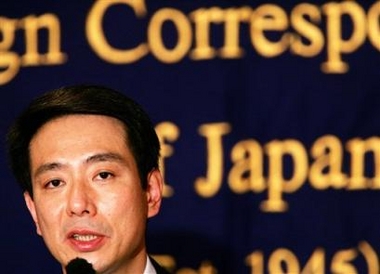|
Japanese PM urged to avoid shrine visit
(Reuters)
Updated: 2006-02-17 20:07
A Japanese opposition leader renewed his call Friday for Prime Minister
Junichiro Koizumi and top Cabinet members to stop visiting a Tokyo war shrine at
the center of tensions with China.

Japan's largest opposition party, Democratic
Party Japan President Seiji Maehara delivers his speech during a news
conference at the Foreign Correspondents' Club of Japan in Tokyo Friday,
Feb.17, 2006. Maehara renewed his demand that Prime Minister Junichiro
Koizumi and other top Cabinet ministers stop making inflammatory visits to
a Tokyo war shrine at the center of political tension with Japan's
neighboring countries. [AP] |
Koizumi's annual visits to the Yasukuni Shrine, which honors Japan's 2.5
million war dead including convicted World War II criminals, has been a "major
setback" for the country's Asian diplomacy, said Seiji Maehara, leader of the
Democratic Party of Japan.
"The prime minister and prominent Cabinet ministers, including the chief
Cabinet secretary and the foreign minister, should not visit a shrine that
honors convicted war criminals," he said.
Koizumi has refused to stop worshipping at the shrine despite repeated
protests from China, which says the visits reflect Japan's lack of remorse about
its wartime aggression. Chinese leaders have refused to meet with their Japanese
counterparts since Koizumi's latest visit to Yasukuni in October.
Koizumi has called the visits a spiritual issue, defending them as a time to
pray for peace and express gratitude for those who sacrificed their lives for
the country.
Maehara also criticized Yasukuni for hosting a museum that displays a
sympathetic view of Tokyo's conquests in East Asia from the late 19th century
until the end of World War II.
"I do not support Yasukuni's historical views and I consider its museum
exhibits glorifying the war greatly problematic," Maehara said.
Maehara has been a frequent critic of shrine visits by Koizumi and his top
Cabinet ministers.
He said the country's leaders should remember that Japan accepted the rulings
by the 1946-1948 international war tribunal in Tokyo that convicted 14 wartime
leaders, including then-Prime Minister Hideki Tojo, of war crimes. Tojo and six
others were executed, but they were enshrined at Yasukuni after the government
restored their honor.
During a recent parliamentary session, Chief Cabinet Secretary Shinzo Abe
said the government acknowledges the tribunal's rulings but has never identified
who was responsible for war crimes.
|